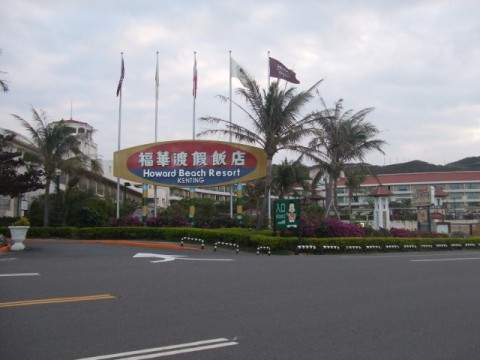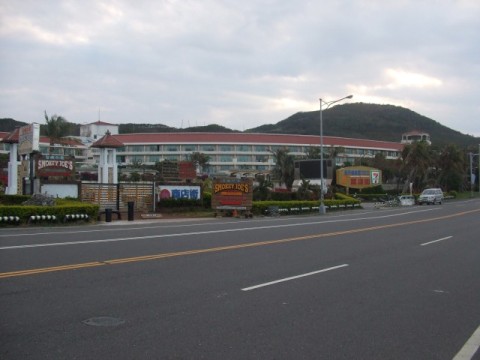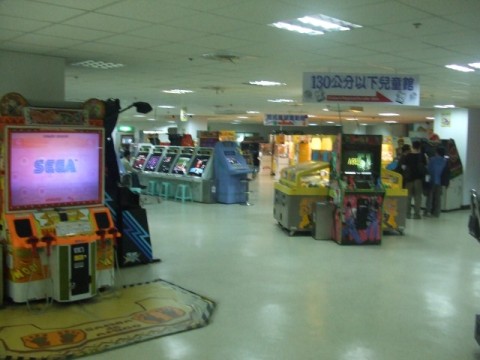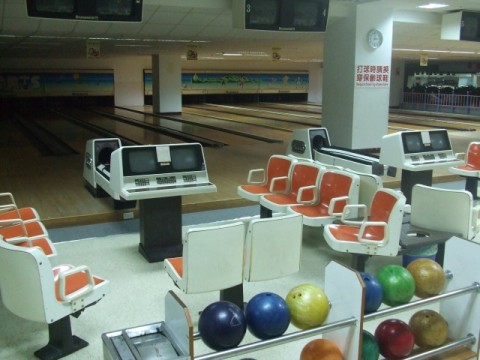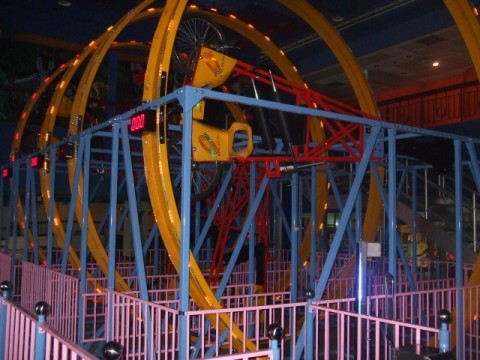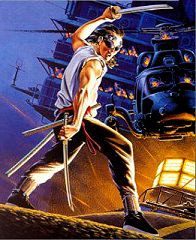This is out of chronological order, but I thought I would talk a little about my adventure in getting to the conference. I left on Jan. 11, and my itinerary was to fly to San Fransisco, then fly to Taipei, and then stay the night in Taipei because I wouldn’t arrive there until 9:00 p.m. and I didn’t feel like spending another 3~4 hours getting to Kenting late at night and jet-lagged. Fortunately the organizers of the conference provided a nice pdf of our different travel options and how to get there. They had arranged with a few hotels in Taipei for us to have discounts, so I chose to stay at the Monarch Plaza Hotel since it seemed to be fairly close to the airport.
However, things didn’t go quite as planned. A huge storm rolled into San Francisco that morning, and I ended up missing my flight from SF to Taipei. There is only one flight a day, so I ended up having to stay the night in SF and catch the same flight the next afternoon. Not great, but my travel expenses were being covered, so I made the best of it.
The next day the flight from SF to Taipei went fine, and I arrived at the airport a little later, around 11:00 pm. I wasn’t sure how to get to the hotel, but when I went to the taxi terminal all I had to do was show a print-out of my reservation that had the hotel’s letterhead at the top, and the the cab driver nodded acknowledgment and took me to my destination. Arriving at the hotel though, I was a little surprised. It was really nice hotel, much nicer than anything I had ever stayed in before in my life (turns out it’s a 5-star hotel). From what I could see, the other guests were either foreign businessmen or airline pilots and stewardesses. After forcing myself not to gape at the Singapore Airlines stewardesses, I managed to find my room and get some sleep.
The next day my real adventure began. I was in kind of a unique situation trying to navigate my way around, because although I do not speak a word of Chinese besides she she, I can read well over a 1000 Chinese characters due to my Japanese experience. So every sign I saw I could often get an idea of what it was talking about, even if the whole meaning escaped me. Getting a taxi at a 5-star hotel is no problem, and every staff member there spoke excellent English so I was able to make sure the cab driver knew I wanted to the high-speed rail station. Once there I was on my own, but it turns out that Taiwan is very cosmopolitan and foreigner-friendly in this respect. Every sign had English and Chinese, and getting from Taoyuan to Zuoying (the last stop) was quite simple.
To go to Kenting though, I couldn’t take the train as it was simply too rural. Now if I had made my original flight, then there would have been a shuttle bus for me and all the other conference attendees to take from Zuoying station to the hotel. I was a day late and by myself though. After descending from the train station at Zuoying though, I was instantly mobbed by about 5 taxi drivers, trying to convince me in very broken English that I needed to go with one of them. Now, according the travel itinerary pdf I had printed out, there were a couple of tour bus companies nearby that could also take me to the hotel. So my conversation with the taxi drivers went like this:
Taxi 1: Where you go?
Me: To Kenting, Howard Beach Hotel.
Taxi 2: We know this place! We take you there!
Me: How much?
Taxi 1: 2000 dollar. (meaning New Taiwan Dollar [NTD], with exchange rate of about 30 NTD to 1 US$)
Me: (looking at bus information, I see that the bus fare is less than a quarter of this price, and I point it out to them) I’ll take the bus.
Taxi 1-4 (shaking heads vigorously) : No, bus too slow! You need taxi!
Taxi 2: I take you for 1600 dollar!
Taxi 3: 1500 dollar!
Taxi 4: 1400 dollar!
Taxi 2: 1000 dollar!
I wait for moment, seeing if the other three are going to underbid him. I also consider my situation: I didn’t speak the language, and frankly didn’t even know where the bus station I needed was. My travel expenses were being covered, and he was willing to drive me for about 2 hours and charge only the equivalent of $30. I shrugged and said, “OK, lets’ go!”
The first thing he said was, “ok, I also drive my father, mother. ok?” He doesn’t wait for an answer before he waves at an elderly couple sitting nearby who then stand up and begin following him. The taxi driver takes my suitcase, and I shrug and start following also. His taxi is parked a couple of blocks away. It’s clean and smells good, right up with the Japanese standard in taxi cab excellence. I breathe a small sigh of relief. In the end I’m sitting behind the driver’s seat, with an elderly Chinese lady to my right, and an elderly Chinese gentlemen up in the passenger seat.
Now the driver’s English seemed to be limited to price negotiation, so he didn’t have much more to say. I took a chance though and asked his father in Japanese if he understood Japanese. After a short pause, he responded back in Japanese, “Yes, but it’s been a long time.”
So I was able to talk to his father in the taxi for about an hour. He of course learned Japanese in school during the Japanese occupation. He didn’t seem very forthcoming on any details about that period, and I didn’t want to pry in a potentially touchy subject. He at least didn’t seem to mind speaking it with me though. The conversation was interesting in that his vocabulary was very limited in certain ways, especially in loan-words. He didn’t seem to understand any katakana words that I used, even though they are now definitely part of the standard Japanese lexicon. I can only assume that they either weren’t adopted into Japanese yet 60 years ago, or that he was simply never exposed to them in his Japanese education. Also he used words like 家内 for his wife, where I am much more used to 奥ã•ã‚“ for the same.
It turned out that the taxi driver was just taking his parents home, which was in a small village about half-way to our destination and not really out of the way. As we got farther away from the industrialized west coast and things started to get more and more rural, things also seemed to look more and more run-down. It was really strange compared to my impression of Taoyuan and Zuoying, which was that if you added some hiragana and katakana to all these signs, you’d never know you weren’t in Japan! I have visited and lived in many very rural areas in Japan, but I had never seen whole towns in Japan that looked as run-down as this area was. It reminded me of places in the US that used to be big tourist destinations, but have now dwindled down as people’s interests took them other places. When we got to the father’s home he thanked me very much and invited me to visit and stay for a couple of days if I ever had the opportunity. I thanked him very much, but I knew I would almost certainly never be this way again.
After that the drive was mostly silence, but as we got to the coastal road the scenery was really beautiful, so conversation wasn’t really needed. Once we got to the southern shore area, there were really only two kinds of places: large resort hotels, or small towns that looked like the main economy was catering to tourists. I finally arrived at the Howard Beach Resort safe and sound. I was a day late and had actually missed that morning’s conference talks, but it was a fun trip to get there all the same.
Next post I’ll show some more pictures of the hotel and nearby town, with my observations.

